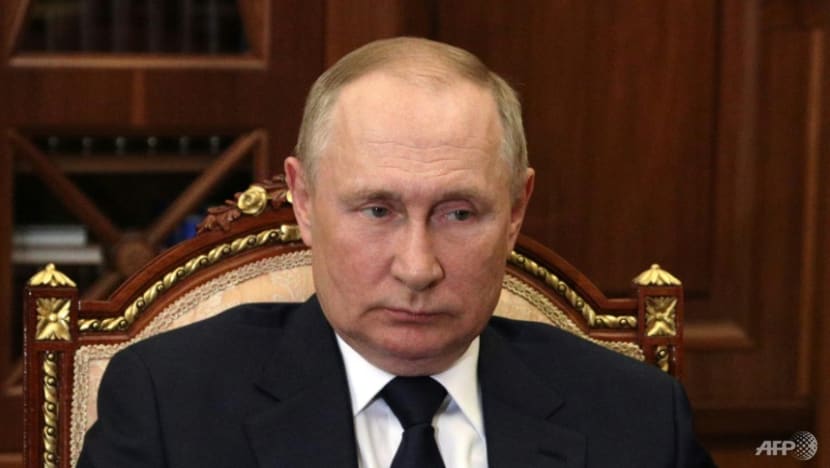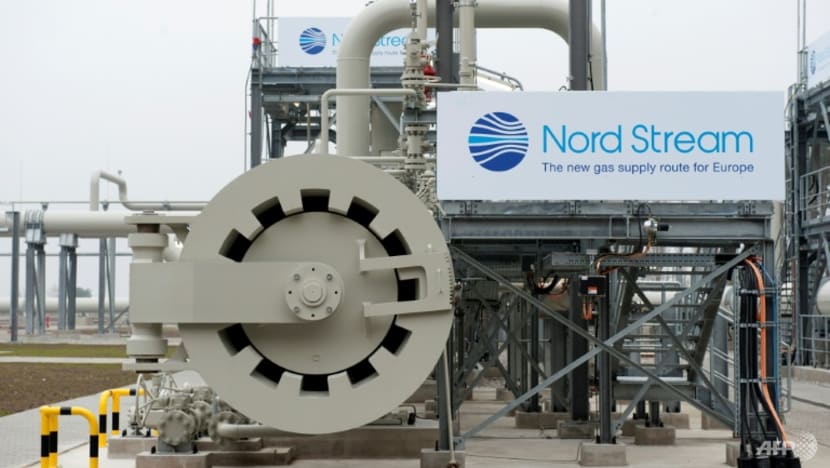Commentary: Shutdown of key gas pipeline to Europe is a sign of Putin’s desperation
Russia has shut the Nord Stream 1 pipeline, a key gas supply to Western Europe, and blamed it on sanctions. But Europe has been preparing for this day, while Russian President Vladimir Putin is running out of options, says international security expert Stefan Wolff.

BIRMINGHAM: With the Nord Stream 1 pipeline shut down indefinitely by Russia since Friday (Sep 2), Russian gas supplies to Western Europe have hit a new low. While Gazprom has attributed this to an oil leak, Moscow was clear about who was to blame for Europe’s energy crisis: The West.
On Monday, the Kremlin warned that gas supply will not be resumed until sanctions are lifted. Europe had already been on edge in July, when the Nord Stream 1 pipeline was shut for 10 days for annual maintenance.
Only three gas pipelines into Europe are still operational - one through Ukraine and into Slovakia, one through Belarus into Poland, and one underneath the Black Sea via Turkey into Bulgaria. And having just dealt with an extreme summer of heatwaves and floods, Western Europe faces the prospect of an uncertain winter.
This escalating energy war has thrown the economic dimension of the war in Ukraine into sharp relief once again: The West may not be at war with Russia militarily, but economically, it clearly is. And much like the situation on the battlefields of eastern and southern Ukraine, an end is not in sight.
WILL WESTERN UNITY CRUMBLE?
Similarly worrying is the prospect of Western unity crumbling in the face of Russian economic warfare.
Domestic pressure on European political leaders will increase as people struggle to heat their homes, businesses will be bankrupted by surging energy prices, and public services - from schools, to hospitals, and transport - will be squeezed between higher demand and exploding costs.

Moreover, Russian foreign minister Sergei Lavrov has also accused the West of continuing to block Russian food and fertiliser exports, despite commitments to the contrary in a United Nations and Turkey-mediated deal facilitating Ukrainian grain exports. This raises the spectre of Russia reneging on its own commitments and reimposing its blockade of Ukrainian Black Sea ports.
This could again exacerbate a global food crisis that is also one of the drivers behind a deeply worrying cost-of-living crisis in the West, where inflation has hit record highs.
VLADIMIR PUTIN’S “GAS BLACKMAIL”
Yet, an economic collapse into a deep and prolonged recession is not inevitable. Nor is it impossible for Europe to free itself from the threat of what Ukrainian Volodymyr Zelenskyy called Russia’s “gas blackmail”.
In the short term, the European Union and its member states will have to help their people, especially the poorest households, get through what will undoubtedly be a tough and challenging winter.
Germany announced, on Sunday, a package of measures worth €65 billion (US$64.7 billion) to cope with the energy crisis and its broader social and economic consequences. A similar package is expected in the United Kingdom from new Prime Minister Liz Truss.
Meanwhile, the G7 countries have agreed to impose a price cap on Russian oil. The EU has continued to adjust its own response by adding proposals for national windfall taxes on energy companies to existing plans to allow more state aid to electricity producers and suppliers and measures to reduce and shift demand.
In particular, Germany, which was highly dependent on Russia for its energy needs, has managed to reduce its imports, from 55 per cent before the war to about 35 per cent of its gas currently.
At the same time, gas storage facilities in Europe were reportedly 80 per cent full at the end of August and likely ahead of target to reach their full capacity. This alone does not solve the EU’s energy problems, but it buys European leaders more time as they scramble for alternative supplies.
Critical here will be liquified natural gas (LNG) and investment in the necessary infrastructure, including land-based terminals. Other short-term measures now embraced across Europe are a temporary return to coal as an energy source and a slowdown in phasing out of nuclear power stations.
In the long run, however, the energy crisis reinforces the need for a transition away from fossil fuels as the best strategy towards sustainable energy independence.
HAS RUSSIA RUN OUT OF OPTIONS?
Where does all this leave Russia? The short answer is, not in a good place.
By shutting down Nord Stream 1, Russian President Vladimir Putin has played one of his last cards in the economic war with the West.
Moscow’s military campaign has long lost its momentum and has been, since the beginning of Ukraine’s counter-offensive in Kherson, increasingly on the backfoot. In another sign of desperation, Russia’s war effort now has become dependent on arms supplies from North Korea.
It is evident that the Kremlin has run out of options on the military and the economic battlefields.
There will still be more pain for all who stand against Russia in this war. But if the West holds its nerve now - keeping up its own sanctions against Moscow and doubling down on military support for Ukraine - the tide may turn even more decisively against Russia.
Stefan Wolff is a Professor of International Security at the University of Birmingham.

















